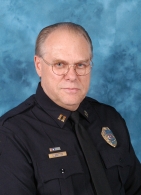Rock Beats
Q&A with Chris Bratton

When did you join the City?
I joined in November, 1979 — 28 years ago. I started as a patrolman and moved up to captain.
What made you decide to go into law enforcement?
I was a police officer in
What was the Police Department in Round Rock like when you started?
Very small. Gene Collier was the Chief of Police. Wes Wolf was the lieutenant. We only had about eight officers.
Did you have any mentors at the City when you started?
Wes was a big influence on me. Bob Griffith was another mentor for me. He helped a lot. Dale Swofford was another big help. His son now works in Building Inspection. These men helped me to understand politics in a small town. It’s a whole different ballgame. They taught me how to survive in small town politics. Bob was a City Councilman.
What do you think has been the most important or significant change in Round Rock?
I think the most significant change in the city government is the diversification of the income stream because it’s critically affected the way we do business. At one point, Round Rock could have easily ended up like Rolling Wood or West Lake Hills — just a little pocket near Austin. The decision to actively become a player in the metropolitan area and try to pull business into the city is probably the most significant change that we’ve seen. It affected all of us both in the size of the city and in the wages and benefits for City employees because it greatly increased our income. In 1980, the City budget was around $10 million; now, it’s around $120 million. Our growth has been phenomenal and we’ve become influential in the metropolitan area.
What was you favorite aspect of your job?
It’s hard to say. There are aspects that are fun and others that are not. Being a detective was probably the most fun. I worked cases and dealt with people and had an impact on people’s lives. I also enjoyed working in the Criminal Investigations divisions. I also liked being a negotiator. I did that in
How do you think the Department will manage without you?
Very well. I can step away knowing that it’s in good hands and they will do well.
What sort of changes have you seen in law enforcement during your career?
I’ve seen it change dramatically in more than 30 years. I remember when the Miranda Rule was handed down. The biggest change has been in technology. We have really good equipment now. When I started, we had radios that had to “warm-up” before you could talk. The cars are safer. The training is infinitely better. We’ve learned from our mistakes what works and what doesn’t. We’ve adopted those things that make it safer for the officers. That means they can do they’re job with less risk to citizens. We do driver training all the time. Years ago, driver training was a rarity.
To give an example of the scope of how things have changed even in Round Rock, when we hire officers now, they go through an eight-week orientation academy showing how the City operates and the equipment and everything. Then they go to an FTO program that can run from two to four months where they train on the job with another officer. Then, they go out on their own but are closely supervised.
My first day on the job in Round Rock, the Chief pitched me the keys to the car and said go out and do your job. I asked if I could have a map to find my way around and he suggested I try the Chamber of Commerce. That was all the job training I got. We’ve come a long way.
Do you have any plans for your retirement?
I plan to teach training courses around the country. I’ll be working on my own and with a group in
I’ve had a great career here. Twenty-eight years is a long time. I’d always heard that when you are ready to retire, you’ll know. That’s certainly true for me. I’ve gotten to a point in my life where there are other things I want to go do. It’s time to make that change. I want to finish my Masters Degree in Organizational Psychology and spend my time teaching. I’ll also have time to do some traveling with my family. I plan to show my wife and son as much of the country as possible.
Leave a note for Chris in the comments.
2 thoughts on “Q&A with Chris Bratton”
Comments are closed.

Chris, it has been a pleasure working with you the past six years. We will certainly miss your visits to the Purchasing Department.
Enjoy your travels and “write” if you do well.
You are a valuable asset to the City, and the Fire Department will miss you. Enjoy your retirement.